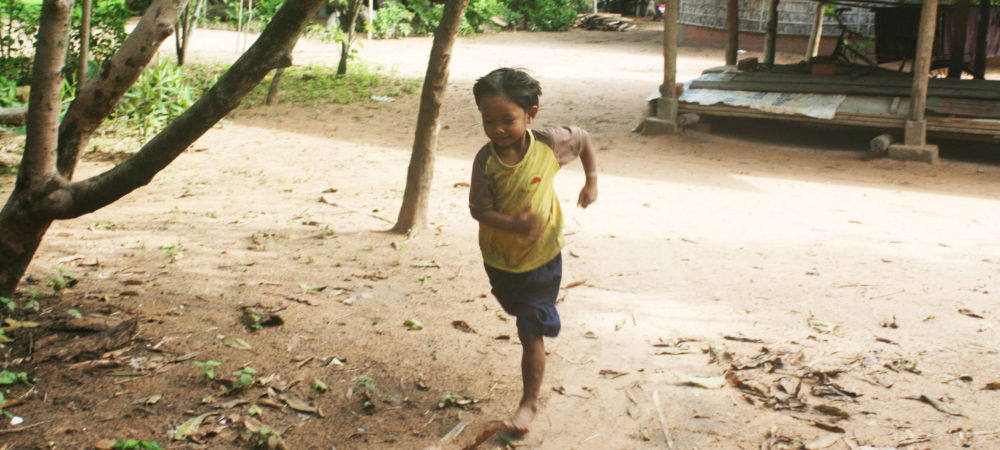“By working at the NGO offices at the Bayon pastry school in town, we are a bit like in a bubble, far from the reality of the field, with the smell of croissants, open-air cinema, tourists and the expat’ community who come to order their birthday cakes … Even by making daily trips to the primary school inside Angkor temples area, we can forget where our students come from. At school, they are all dressed in the same way with their pretty white and blue uniforms, they come to us respectfully saying “Tchum Ripsour!”. Hands pressed against each other, they laugh, they run, and seem happy, far from their problems. Always smiling, never crying, these children impress us constantly.But the family visits remind us where they come from, the reality of our programs and the impact of our actions.

Soky, our primary school social worker, needs to re-evaluate the social level of all students’ families each year. It is a huge fieldwork that takes time and requires a lot of physical and mental energy. She must visit each family and complete the survey that has been preset by the social team. Professions and salaries of families’ members, characteristics of the house and the land, loans and debts … Families must reveal their limited resources. This is the moment to talk about their problems if Soky is not yet aware of them : the husband has just left with another woman, the son has stopped school to work and help the family, rice had to be borrowed from the neighbors because of a lack of resources… The situations are very diverse and none of the family situations are the same.
For these visits Soky is never alone. A “Barang”, in other words a white person, go with her every time. We follow her on dirty roads and sand, through puddles due to the rainy season, not to mention plastics everywhere. We arrive then in the family where all the discussions are in Khmer. We help Soky to take pictures of the house and we can ask complementary questions. For some members of the association, this is the opportunity to visit the villages for the first time and to meet our families in their environment where time seems to stop. Even without speaking Khmer, we can analyze the faces, the expressions, the silences and the intonations of each one. We can sometimes understand the discomfort and see what would like to remain hidden. Complicated in this culture where you must save face … Analyze which family is more in need than another is a heavy task. How do you compare an orphan with a family who has a seriously ill parent, a home with 10 members under the same roof, to another whose child has a severe mental handicap that is not supported anywhere in Cambodia? It is Soky’s hard work: she is constantly in the villages in contact with our families. Listen and understand without being overwhelmed by her emotions, keep a distance while keeping her humanity.
Even without speaking Khmer, we can analyze the faces, the expressions, the silences and the intonations of each one. We can sometimes understand the discomfort and see what would like to remain hidden. Complicated in this culture where you must save face … Analyze which family is more in need than another is a heavy task. How do you compare an orphan with a family who has a seriously ill parent, a home with 10 members under the same roof, to another whose child has a severe mental handicap that is not supported anywhere in Cambodia? It is Soky’s hard work: she is constantly in the villages in contact with our families. Listen and understand without being overwhelmed by her emotions, keep a distance while keeping her humanity.

Soky, our primary school social worker, needs to re-evaluate the social level of all students’ families each year. It is a huge fieldwork that takes time and requires a lot of physical and mental energy. She must visit each family and complete the survey that has been preset by the social team. Professions and salaries of families’ members, characteristics of the house and the land, loans and debts … Families must reveal their limited resources. This is the moment to talk about their problems if Soky is not yet aware of them : the husband has just left with another woman, the son has stopped school to work and help the family, rice had to be borrowed from the neighbors because of a lack of resources… The situations are very diverse and none of the family situations are the same.
For these visits Soky is never alone. A “Barang”, in other words a white person, go with her every time. We follow her on dirty roads and sand, through puddles due to the rainy season, not to mention plastics everywhere. We arrive then in the family where all the discussions are in Khmer. We help Soky to take pictures of the house and we can ask complementary questions. For some members of the association, this is the opportunity to visit the villages for the first time and to meet our families in their environment where time seems to stop.
 Even without speaking Khmer, we can analyze the faces, the expressions, the silences and the intonations of each one. We can sometimes understand the discomfort and see what would like to remain hidden. Complicated in this culture where you must save face … Analyze which family is more in need than another is a heavy task. How do you compare an orphan with a family who has a seriously ill parent, a home with 10 members under the same roof, to another whose child has a severe mental handicap that is not supported anywhere in Cambodia? It is Soky’s hard work: she is constantly in the villages in contact with our families. Listen and understand without being overwhelmed by her emotions, keep a distance while keeping her humanity.
Even without speaking Khmer, we can analyze the faces, the expressions, the silences and the intonations of each one. We can sometimes understand the discomfort and see what would like to remain hidden. Complicated in this culture where you must save face … Analyze which family is more in need than another is a heavy task. How do you compare an orphan with a family who has a seriously ill parent, a home with 10 members under the same roof, to another whose child has a severe mental handicap that is not supported anywhere in Cambodia? It is Soky’s hard work: she is constantly in the villages in contact with our families. Listen and understand without being overwhelmed by her emotions, keep a distance while keeping her humanity.
On our side, the day is over, we return to our cocoon in town. But all these faces, all those vulnerable families who live in these wooden houses, without water, without electricity, in contact with dogs filled with fleas and tiger mosquitos did not leave us indifferent. They remind us of the choice we made, why we get up every morning, in case we tend to forget it.”


